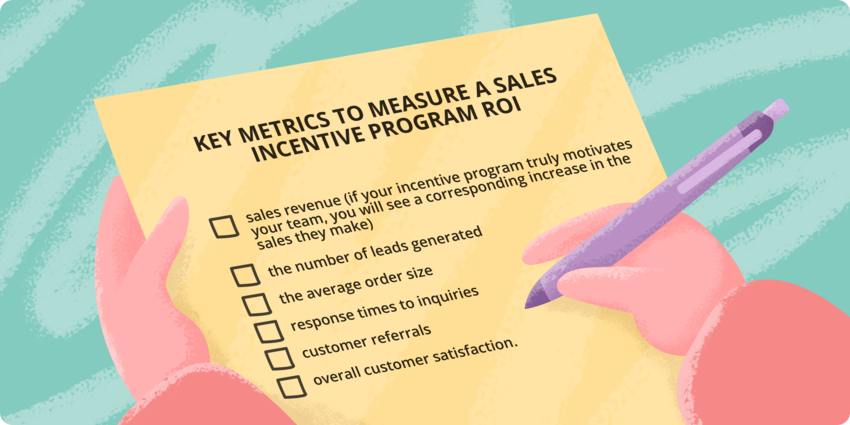Well done on bringing your team this far!
You’ve carefully selected the right people, trained them, and equipped them with top-notch sales prospecting tools and sales collateral to attract and inform potential customers.
But your work doesn’t stop there, as you need to find a way to keep your team motivated and focused on hitting their sales targets.
While it’s true that money can be a strong motivator, it’s not the only factor that impacts performance. So why not consider incorporating some fun team-building activities or offering extra vacation days for top performers? The key is finding incentives that motivate your team to work harder and achieve their goals.
Crafting the perfect incentive program requires a certain finesse, but when done correctly, it can work wonders for your team’s performance. A well-designed sales incentive program not only inspires your team to sell more and meet their quotas but also promotes team unity and friendly competition among team members.
In this blog post, we’ll dive into the various types of sales incentive programs and, hopefully, help you choose the perfect one for your sales team.
Outline:
What are sales incentive programs, and why do they matter?
Sales incentive programs are typically designed to reward sales teams for high performance, such as closing deals or driving revenue. They can come in the form of cash bonuses, prizes, trips, or special privileges, and their goal is to encourage employees to exceed their sales targets.

Source: Spotio
However, it’s important to note that these incentives should complement and not replace regular compensation plans and commissions that salespeople receive.
There’s been a lot of debate over whether monetary rewards, like bonuses, are the best way to motivate people. As studies have shown, more money doesn’t always equal better performance. In fact, most people also want to be recognized as contributing members of a winning team.
Moreover, as indicated in the Harvard Business Review study:
|
“The more people focus on their salaries, the less they will focus on satisfying their intellectual curiosity, learning new skills, or having fun, and those are the very things that make people perform best.” |
FACT: In the 1990s, only 25% of U.S. companies used non-cash incentives, compared to 89% today.
Meanwhile, the applied in sales 80/20 Pareto Principle shows that 80% of sales are made by 20% of reps. It means that incentivizing only high performers can create division among team members and tension within the team.
This can be prevented when you unlock your entire team’s potential by encouraging friendly competition and implementing a fair and well-thought-out sales incentive program (non-cash!).
NOTE: Keep your goals realistic when setting up a sales incentive program. You don’t want to set the bar too high and have your team feel demoralized when they inevitably don’t reach it. But you also don’t want the goals to be so easy that your team feels like they’re not working hard enough.
One way to find out what’s reasonable is to ask your team for input. Another way is to look at your company’s past performance and set a challenging but achievable goal.
Here are some ideas we can offer based on the five sales incentive schemes that are distinguished to help you craft your program correctly and get the most out of it.
Five types of sales incentives schemes
Let’s take a closer look at the five key groups of incentives that will help you better understand the unique drivers that motivate your sales team.

Source: Freshworks
1. Role-specific incentives
Role-specific incentives help motivate individual sales reps by offering rewards for outperforming their colleagues or even themselves.
Sales incentive ideas:
You can start with something simple, like awarding bonus points, gift cards, or discounts on services. They may still seem like monetary rewards, but they are great for individual sales incentives as they give your team members the freedom to select the gift they want the most.
But why stop there? You can also try something slightly more ambitious, like offering exclusive VIP experiences—an opportunity available to a select few. These could include a behind-the-scenes tour of your company, an opportunity to hobnob with business leaders, or a chance to have fine dining in a fancy restaurant where reservations are made months ahead.
Whatever it may be, VIP experiences offer something special and unique that is not available to just anyone. They are designed to create a sense of exclusivity and privilege, making the recipient feel special and important. As a sales incentive, this kind of reward can be an extremely effective way to motivate your star performers.
Of course, incentives don’t always have to be extravagant. Something as simple as recognition and words of gratitude from the CEO in front of the company can also serve as a VIP experience.

2. Split incentives
Another way to keep your team motivated is through split incentives, where team members are rewarded based on both their individual performance and the team’s performance as a whole. This strategy offers different rewards for different levels of success.
Split sales incentives are perfect for rewarding your team for meeting specific goals, such as finding a certain number of prospects, signing up new customers, or selling a certain amount of products in a given month.
Sales incentive ideas:
The simplest thing you can do is to offer a smaller bonus for meeting a lower sales target and a larger bonus for surpassing a higher target. This kind of incentive system can be highly motivating for your team, as they will work harder to achieve the larger bonus while ensuring everyone is working towards the same goal.
But the key to a successful incentive program is the type of bonus you offer. Just money? Yes, great! But you can also consider offering gym or swimming pool memberships, golf or yoga classes, or other wellness-related perks. These types of incentives can be especially appreciated by younger employees who strive for a healthy work-life balance.
And for those who seek adventure, you can also offer extreme sports experiences like skydiving, bungee jumping, or white-water rafting. These incentives are particularly attractive to millennials, who are always looking for unique and exciting experiences.
Let’s not forget the importance of maintaining a balanced lifestyle to optimize team performance. Encourage your team with additional incentives that promote wellness and health.
Consider offering options such as health-centric incentives like wellness workshops, mindfulness sessions, or nutrition consultations. Supporting your team’s well-being fosters a positive work environment and enhances productivity.

3. Presales incentives
Selling products with a long sales cycle, like enterprise-level software, can be challenging. It requires a team of creative individuals who work tirelessly to ensure a successful sale.
Presales activities involve market research, competitor analysis, lead generation, lead qualification, writing email scripts, and much more. These activities can take months before a customer is acquired. That’s a long time to stay motivated and engaged, so it’s essential to offer your team presales incentives that keep them going.
Sales incentive ideas:
One way to show appreciation for your star performers is by giving them a free travel voucher. Imagine their excitement when they hear that they’ll be going to their dream destination for free!
And if you want to motivate the entire team at the kick-off stage of your product, why not incentivize them with a trip to the destination of their choice? Of course, this incentive requires a larger budget, but the benefits are worth it.
If your budget is a little tighter, there are plenty of other options available. You can offer tickets to a concert, theater performance, theme park, festival, or sporting event. Alternatively, a day in a SPA is a good option, too.
Creatives are often curious individuals, so a solid incentive for them will be different kinds of experiences that will help them expand their knowledge and skills. These could include master classes in singing, dancing, painting, photography, cooking, or even hand-made crafts.
Remember to ask your team what they’re interested in before you start purchasing vouchers!
4. Omnichannel incentives
These rewards are given to salespeople who work across all channels, whether digital or face-to-face. If a customer contacts a sales rep after receiving an automated targeted email or seeing an ad on social media, and the deal is closed afterward, the sales rep should be awarded for their effort.
Sales incentive ideas:
You can use the ideas from role-specific or split incentive plans and tailor them to align with your salespeople’s interests. Is your rep tech-savvy? A smartwatch or a tablet would be a great incentive. You can also offer a premium subscription to tools/software to help them excel in their sales career (hmmm… why not consider Snov.io’s advanced lead gen tools?)
And if you want to incentivize a group of top performers, consider something unforgettable like a sailing trip on a cruise liner. The options are limited only by your imagination. Ultimately, all that matters is if your team feels their efforts are being recognized and appreciated.
5. Analytics-based incentives
These are advanced sales incentive plans developed using big data analytics.
By analyzing data on individual salespeople and teams, you can create personalized sales incentive plans that motivate your team and boost performance. This approach allows you to take a comprehensive view of your sales team’s needs and tailor incentives to what works best for each individual.
Sales incentive ideas:
While analytics-based incentive ideas may differ from other types of incentives, such as role-based and split incentives, the underlying principles remain the same. The difference is that analytics-based incentives rely on data analysis to tailor incentives to the specific needs of each individual sales rep.
Measuring ROI for a sales incentive program
The best way to measure the return on investment (ROI) is to simply compare your team’s performance before and after implementing the incentive program. To track progress and make necessary adjustments, establish some baselines for key metrics.
These are some key metrics you can look at:

By analyzing these metrics, you can gain valuable insights into how your incentive program impacts your team’s performance.
To ensure your program is working effectively, it’s important to check in with your team members and make sure they understand the incentive plan and what they need to do to earn the rewards. Clear communication and understanding are key to motivating your team to work towards their goals.
If your incentive program isn’t driving the desired results, don’t hesitate to make changes and adjustments. Use your collected data to identify areas where improvements can be made and test new approaches until you find what works best for your team.
Bottom line
Investing in your team provides an invaluable ROI by creating a positive working environment that encourages motivation and engagement among your sales force.
While money is undoubtedly a common motivator, it’s not the only one. It would be wise to consider other rewards to boost your team’s performance, and non-cash sales incentive programs are at the top of mind.
But before you start crafting your most advanced program, ensure that your team has the resources they need to succeed, such as competitive salaries, benefits packages, and the support of upper management. And, of course, appropriate technology tools to generate and engage leads faster and convert them into paying customers.
Do you need go-to solutions for your sales right now? Snov.io, with its avant-garde sales toolbox and CRM platform that deliver growth, is here for you!





